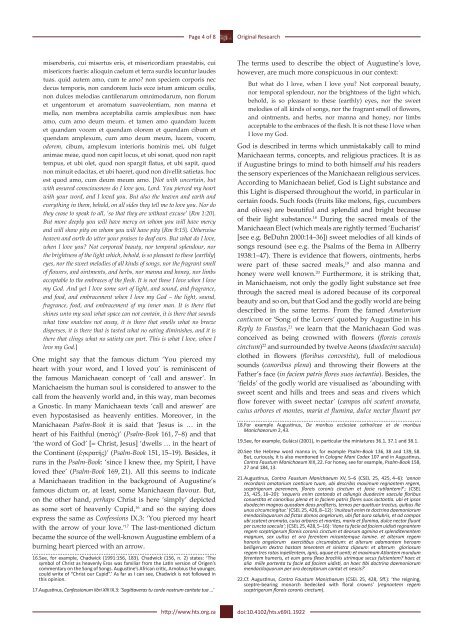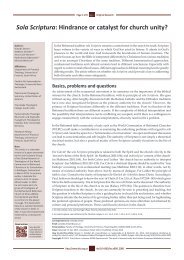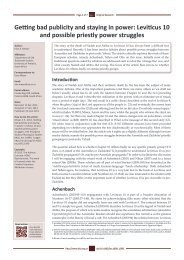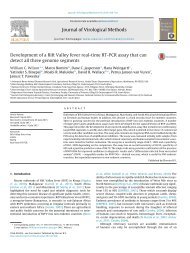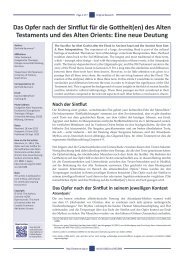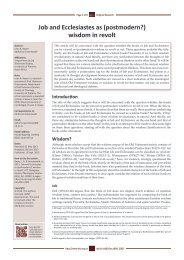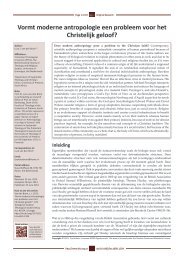A Manichaean analysis of Augustine's Confessions, Book X - HTS ...
A Manichaean analysis of Augustine's Confessions, Book X - HTS ...
A Manichaean analysis of Augustine's Confessions, Book X - HTS ...
Create successful ePaper yourself
Turn your PDF publications into a flip-book with our unique Google optimized e-Paper software.
Page 4 <strong>of</strong> 8<br />
Original Research<br />
misereberis, cui misertus eris, et misericordiam praestabis, cui<br />
misericors fueris: alioquin caelum et terra surdis locuntur laudes<br />
tuas. quid autem amo, cum te amo? non speciem corporis nec<br />
decus temporis, non candorem lucis ecce istum amicum oculis,<br />
non dulces melodias cantilenarum omnimodarum, non florum<br />
et ungentorum et aromatum suaveolentiam, non manna et<br />
mella, non membra acceptabilia carnis amplexibus: non haec<br />
amo, cum amo deum meum. et tamen amo quandam lucem<br />
et quandam vocem et quendam olorem et quendam cibum et<br />
quendam amplexum, cum amo deum meum, lucem, vocem,<br />
odorem, cibum, amplexum interioris hominis mei, ubi fulget<br />
animae meae, quod non capit locus, et ubi sonat, quod non rapit<br />
tempus, et ubi olet, quod non spargit flatus, et ubi sapit, quod<br />
non minuit edacitas, et ubi haeret, quod non divellit satietas. hoc<br />
est quod amo, cum deum meum amo. [Not with uncertain, but<br />
with assured consciousness do I love you, Lord. You pierced my heart<br />
with your word, and I loved you. But also the heaven and earth and<br />
everything in them, behold, on all sides they tell me to love you. Nor do<br />
they cease to speak to all, ‘so that they are without excuse’ {Rm 1:20}.<br />
But more deeply you will have mercy on whom you will have mercy<br />
and will show pity on whom you will have pity {Rm 9:15}. Otherwise<br />
heaven and earth do utter your praises to deaf ears. But what do I love,<br />
when I love you? Not corporeal beauty, nor temporal splendour, nor<br />
the brightness <strong>of</strong> the light which, behold, is so pleasant to these {earthly}<br />
eyes, nor the sweet melodies <strong>of</strong> all kinds <strong>of</strong> songs, nor the fragrant smell<br />
<strong>of</strong> flowers, and ointments, and herbs, nor manna and honey, nor limbs<br />
acceptable to the embraces <strong>of</strong> the flesh. It is not these I love when I love<br />
my God. And yet I love some sort <strong>of</strong> light, and sound, and fragrance,<br />
and food, and embracement when I love my God – the light, sound,<br />
fragrance, food, and embracement <strong>of</strong> my inner man. It is there that<br />
shines unto my soul what space can not contain, it is there that sounds<br />
what time snatches not away, it is there that smells what no breeze<br />
disperses, it is there that is tasted what no eating diminishes, and it is<br />
there that clings what no satiety can part. This is what I love, when I<br />
love my God.]<br />
One might say that the famous dictum ‘You pierced my<br />
heart with your word, and I loved you’ is reminiscent <strong>of</strong><br />
the famous <strong>Manichaean</strong> concept <strong>of</strong> ‘call and answer’. In<br />
Manichaeism the human soul is considered to answer to the<br />
call from the heavenly world and, in this way, man becomes<br />
a Gnostic. In many <strong>Manichaean</strong> texts ‘call and answer’ are<br />
even hypostasised as heavenly entities. Moreover, in the<br />
<strong>Manichaean</strong> Psalm-<strong>Book</strong> it is said that ‘Jesus is … in the<br />
heart <strong>of</strong> his Faithful (πιστός)’ (Psalm-<strong>Book</strong> 161, 7–8) and that<br />
‘the word <strong>of</strong> God’ [= Christ, Jesus] ‘dwells … in the heart <strong>of</strong><br />
the Continent (ἐγκρατής)’ (Psalm-<strong>Book</strong> 151, 15–19). Besides, it<br />
runs in the Psalm-<strong>Book</strong>: ‘since I knew thee, my Spirit, I have<br />
loved thee’ (Psalm-<strong>Book</strong> 169, 21). All this seems to indicate<br />
a <strong>Manichaean</strong> tradition in the background <strong>of</strong> Augustine’s<br />
famous dictum or, at least, some <strong>Manichaean</strong> flavour. But,<br />
on the other hand, perhaps Christ is here ‘simply’ depicted<br />
as some sort <strong>of</strong> heavenly Cupid, 16 and so the saying does<br />
express the same as <strong>Confessions</strong> IX.3: ‘You pierced my heart<br />
with the arrow <strong>of</strong> your love.’ 17 The last-mentioned dictum<br />
became the source <strong>of</strong> the well-known Augustine emblem <strong>of</strong> a<br />
burning heart pierced with an arrow.<br />
16.See, for example, Chadwick (1991:156, 183). Chadwick (156, n. 2) states: ‘The<br />
symbol <strong>of</strong> Christ as heavenly Eros was familiar from the Latin version <strong>of</strong> Origen’s<br />
commentary on the Song <strong>of</strong> Songs. Augustine’s African critic, Arnobius the younger,<br />
could write <strong>of</strong> “Christ our Cupid”.’ As far as I can see, Chadwick is not followed in<br />
this opinion.<br />
17.Augustinus, Confessionum libri XIII IX.3: ‘Sagittaveras tu corde nostrum caritate tua ...’<br />
The terms used to describe the object <strong>of</strong> Augustine’s love,<br />
however, are much more conspicuous in our context:<br />
But what do I love, when I love you? Not corporeal beauty,<br />
nor temporal splendour, nor the brightness <strong>of</strong> the light which,<br />
behold, is so pleasant to these (earthly) eyes, nor the sweet<br />
melodies <strong>of</strong> all kinds <strong>of</strong> songs, nor the fragrant smell <strong>of</strong> flowers,<br />
and ointments, and herbs, nor manna and honey, nor limbs<br />
acceptable to the embraces <strong>of</strong> the flesh. It is not these I love when<br />
I love my God.<br />
God is described in terms which unmistakably call to mind<br />
<strong>Manichaean</strong> terms, concepts, and religious practices. It is as<br />
if Augustine brings to mind to both himself and his readers<br />
the sensory experiences <strong>of</strong> the <strong>Manichaean</strong> religious services.<br />
According to <strong>Manichaean</strong> belief, God is Light substance and<br />
this Light is dispersed throughout the world, in particular in<br />
certain foods. Such foods (fruits like melons, figs, cucumbers<br />
and olives) are beautiful and splendid and bright because<br />
<strong>of</strong> their light substance. 18 During the sacred meals <strong>of</strong> the<br />
<strong>Manichaean</strong> Elect (which meals are rightly termed ‘Eucharist’<br />
[see e.g. BeDuhn 2000:14–36]) sweet melodies <strong>of</strong> all kinds <strong>of</strong><br />
songs resound (see e.g. the Psalms <strong>of</strong> the Bema in Allberry<br />
1938:1–47). There is evidence that flowers, ointments, herbs<br />
were part <strong>of</strong> these sacred meals, 19 and also manna and<br />
honey were well known. 20 Furthermore, it is striking that,<br />
in Manichaeism, not only the godly light substance set free<br />
through the sacred meal is adored because <strong>of</strong> its corporeal<br />
beauty and so on, but that God and the godly world are being<br />
described in the same terms. From the famed Amatorium<br />
canticum or ‘Song <strong>of</strong> the Lovers’ quoted by Augustine in his<br />
Reply to Faustus, 21 we learn that the <strong>Manichaean</strong> God was<br />
conceived as being crowned with flowers (floreis coronis<br />
cinctum) 22 and surrounded by twelve Aeons (duodecim saecula)<br />
clothed in flowers (floribus convestita), full <strong>of</strong> melodious<br />
sounds (canoribus plena) and throwing their flowers at the<br />
Father’s face (in faciem patris flores suos iactantia). Besides, the<br />
‘fields’ <strong>of</strong> the godly world are visualised as ‘abounding with<br />
sweet scent and hills and trees and seas and rivers which<br />
flow forever with sweet nectar’ (campos ubi scatent aromata,<br />
cuius arbores et montes, maria et flumina, dulce nectar fluunt per<br />
18.For example Augustinus, De moribus ecclesiae catholicae et de moribus<br />
Manichaeorum 2, 43.<br />
19.See, for example, Gulácsi (2001), in particular the miniatures 36.1, 37.1 and 38.1.<br />
20.See the Hebrew word manna in, for example Psalm-<strong>Book</strong> 136, 38 and 139, 58.<br />
But, curiously, it is also mentioned in Cologne Mani Codex 107 and in Augustinus,<br />
Contra Faustum Manichaeum XIX, 22. For honey, see for example, Psalm-<strong>Book</strong> 158,<br />
27 and 184, 13.<br />
21.Augustinus, Contra Faustum Manichaeum XV, 5–6 (CSEL 25, 425, 4–6): ‘annon<br />
recordaris amatorium canticum tuum, ubi describis maximum regnantem regem,<br />
sceptrigerum perennem, floreis coronis cinctum et facie rutilantem?’; (CSEL<br />
25, 425, 16–20): ‘sequeris enim cantando et adiungis duodecim saecula floribus<br />
conuestita et canoribus plena et in faciem patris flores suos iactantia. ubi et ipsos<br />
duodecim magnos quosdam deos pr<strong>of</strong>iteris, ternos per quattuor tractus, quibus ille<br />
unus circumcingitur.’ (CSEL 25, 426, 8–12): ‘inuitauit enim te doctrina daemoniorum<br />
mendaciloquorum ad fictas domos angelorum, ubi flat aura salubris, et ad campos<br />
ubi scatent aromata, cuius arbores et montes, maria et flumina, dulce nectar fluunt<br />
per cuncta saecula’; (CSEL 25, 428, 5–16): ‘itane tu facie ad faciem uidisti regnantem<br />
regem sceptrigerum floreis coronis cinctum et deorum agmina et splenditenentem<br />
magnum, sex uultus et ora ferentem micantemque lumine. et alterum regem<br />
honoris angelorum exercitibus circumdatum: et alterum adamantem heroam<br />
belligerum dextra hastam tenentem et sinistra clipeum: et alterum gloriosum<br />
regem tres rotas inpellentem, ignis, aquae et uenti; et maximum Atlantem mundum<br />
ferentem humeris, et eum genu flexo brachiis utrimque secus fulcientem? haec et<br />
alia mille portenta tu facie ad faciem uidisti, an haec tibi doctrina daemoniorum<br />
mendaciloquorum per ora deceptorum cantat et nescis?’<br />
22.Cf. Augustinus, Contra Faustum Manichaeum (CSEL 25, 428, 5ff.): ‘the reigning,<br />
sceptre-bearing monarch bedecked with floral crowns’ (regnantem regem<br />
sceptrigerum floreis coronis cinctum).<br />
http://www.hts.org.za<br />
doi:10.4102/hts.v69i1.1922


